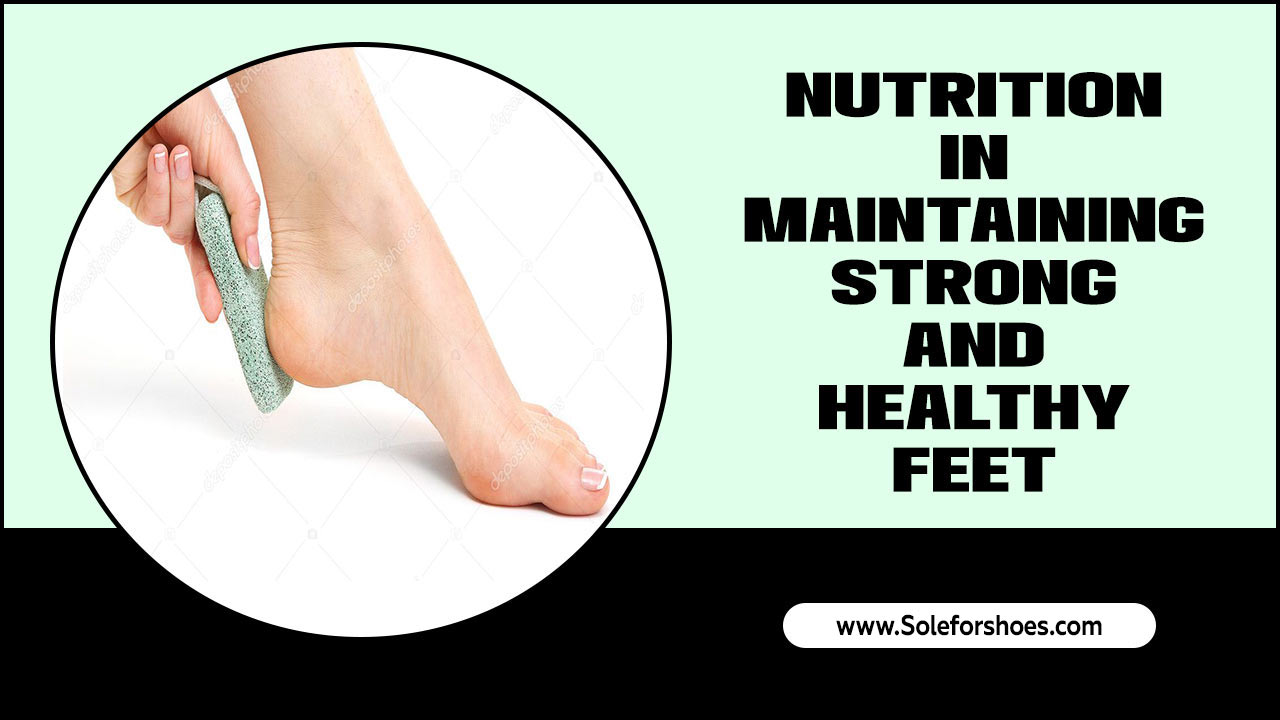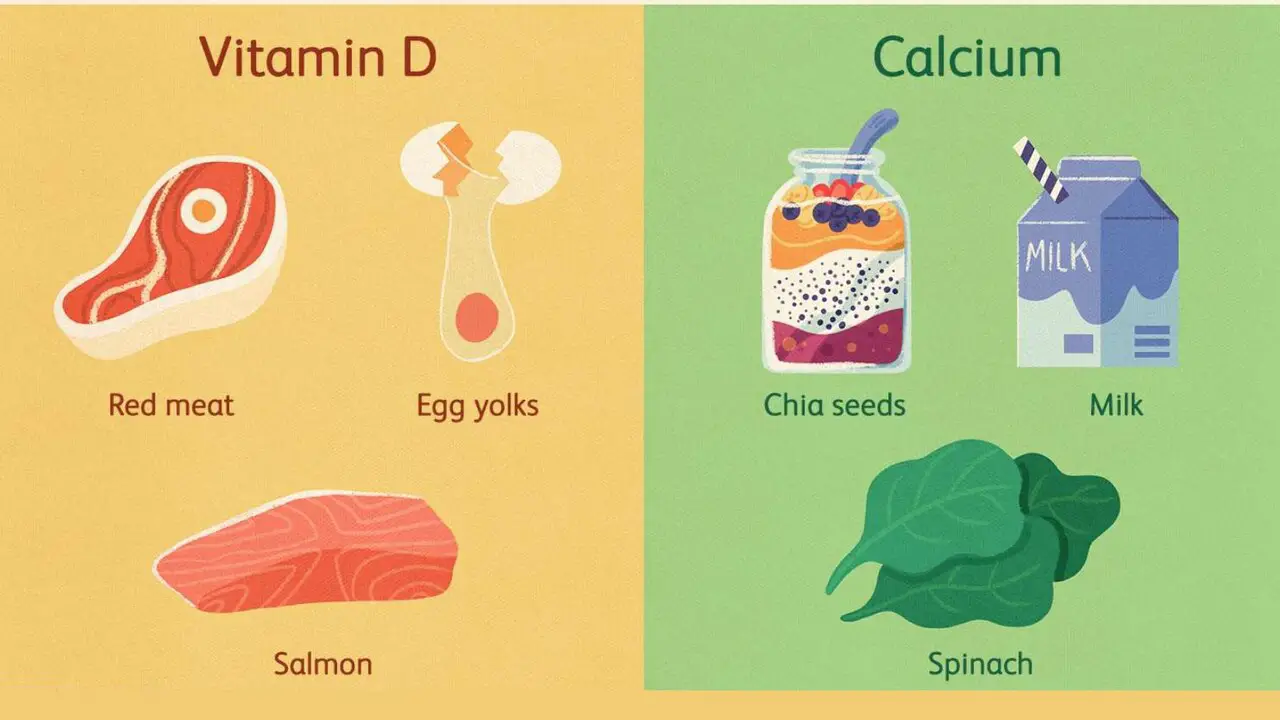The health and strength of our feet are often overlooked when it comes to discussing overall well-being and nutrition. However, the truth is that our feet play a crucial role in our daily lives, supporting us as we walk, run, and engage in various physical activities.
Neglecting the nutritional needs of our feet can lead to various problems, such as weak bones, poor circulation, and even foot pain. As such, it is essential to recognize the importance of proper nutrition in maintaining strong and healthy feet.
Here, we will explore the connection between nutrition and foot health. We have consulted with experts to bring you eight tips on how to maintain healthy feet through proper nutrition. From increasing calcium and vitamin D intake to avoiding high-sugar foods, we have got you covered.

The Role Of Nutrition In Foot Health

Proper nutrition plays a crucial role in maintaining strong and healthy feet. The food we consume provides the essential nutrients that our feet need to stay in optimal condition. A balanced diet rich in vitamins, minerals, and antioxidants can help promote overall foot health by supporting proper blood circulation, reducing inflammation, and strengthening bones and muscles.
Nutrients such as calcium, vitamin D, and magnesium are particularly important for maintaining strong bones and preventing conditions like osteoporosis. Additionally, a diet high in fruits, vegetables, and whole grains can provide antioxidants that help protect against oxidative stress and promote healthy skin and nails. By paying attention to our nutritional intake, we can support the health and well-being of our feet.
The Impact Of Poor Nutrition On Feet
Poor nutrition can have a detrimental effect on foot health. It can lead to various problems, such as flat feet and plantar fasciitis. Inadequate nutrition weakens bones, increasing the risk of fractures in the feet. Lack of proper nutrition may contribute to arthritis, causing foot pain and inflammation.
Unhealthy diet choices negatively affect foot health, including ligaments and tendons. Additionally, poor nutrition can impair nerve health, leading to foot pain and discomfort.
Nutrition In Maintaining Strong And Healthy Feet: 8 Expert Tips

Maintaining strong and healthy feet is crucial for overall foot health and mobility. Nutrition plays a key role in supporting foot health, as it provides the necessary nutrients for proper function and maintenance. By following these expert tips and prioritizing nutrition, you can support the strength and health of your feet for years to come. Here are eight expert tips on nutrition in maintaining strong and healthy feet:
1: Increase Calcium And Vitamin D Intake

To maintain strong and healthy feet, it is important to increase your intake of calcium and vitamin D. You can achieve this by consuming dairy products, leafy green vegetables, and fortified foods. Incorporating foods like cottage cheese, kale, and broccoli into your diet will also help provide the necessary calcium and vitamin D for foot health. By ensuring proper nutrition and increasing your calcium and vitamin D intake, you can promote strong bones and support healthy feet.
2: Consume Omega 3 Fatty Acids

Consume foods rich in omega-3 fatty acids, such as fatty fish, walnuts, and flaxseeds, to support foot health and reduce inflammation. Including these fatty acids in your diet can contribute to good nerve health, heart health, and overall well-being.
Boost your foot health by incorporating omega-3 fatty acids, building blocks of nutritional health, into your daily meals. Ensure proper nutrition for your feet by consuming foods high in omega-3 fatty acids like tuna, sardines, and olive oil.
3: Eat Whole Grains Regularly
Include whole grains like wild rice, whole wheat, and oats in your diet for foot health. Incorporate these nutritious options to support the overall well-being of your feet. Consume foods such as whole grain bread and pasta to ensure you’re getting the building blocks of nutritional health.
By regularly consuming whole grains, you are promoting good nerve health, bone health, weight management, and heart health. Make whole grains a part of your daily routine for good health from head to toe.
4: Include Fruits And Vegetables In Diet
Incorporating fruits and vegetables into your diet is crucial for maintaining strong and healthy feet. To support foot health and overall nutrition, consume citrus fruits, bell peppers, strawberries, and blueberries, which are rich in antioxidants.
Leafy green vegetables like spinach, kale, and broccoli are also essential for foot health and overall well-being. Ensure good nutritional habits by including these foods in your diet, as they provide the building blocks of nutritional health for your entire body.
5: Avoid High-Sugar Foods
To maintain foot health and overall nutrition, it is important to limit your intake of sugary foods. High-sugar foods can negatively impact foot health by increasing inflammation and foot pain. Instead, opt for healthy foods that promote good nerve health and bone health, such as leafy green vegetables, lean meats, and yoghurt.
Avoiding foods with added sugars helps in weight management, heart health, and reducing the risk of type 2 diabetes. Incorporating good nutritional habits into your diet supports the well-being of your feet and the entire body.
6: Eat Lean Proteins

Eating lean proteins is crucial for the health of our feet. These proteins play a vital role in building and repairing tissues, including those found in our feet. Some excellent sources of lean protein include chicken, turkey, fish, beans, lentils, and tofu.
By incorporating these foods into our diet, we can help prevent foot problems like tendonitis and plantar fasciitis. It’s essential to consult with a healthcare professional or registered dietitian to determine the right amount of protein for our individual needs and activity levels.
7: Limit Processed Foods
Processed foods, known for their high levels of added sugars, unhealthy fats, and sodium, can cause inflammation and negatively impact overall health. To maintain strong and healthy feet, it’s essential to consume a diet rich in whole foods.
Opt for fruits, leafy green vegetables, lean meats, and whole grains that provide valuable nutrients. By limiting processed foods, you can maintain a healthy weight and reduce the risk of foot conditions like plantar fasciitis. Swap processed snacks for healthier options like nuts, seeds, and fruits, and consult with a registered dietician or podiatrist for personalized advice.
8: Stay Hydrated
Proper hydration is vital for maintaining healthy feet. Dehydration can lead to muscle cramps, resulting in foot pain and discomfort. Drinking water throughout the day helps reduce swelling and inflammation in the feet.
It’s important to avoid excessive caffeine and alcohol consumption as they can dehydrate the body. If you’re physically active, remember to stay hydrated by drinking water before, during, and after exercise to keep your feet healthy and well-maintained.
Benefits Of Good Nutrition For Feet

Good nutrition plays a crucial role in maintaining strong and healthy feet. By consuming a balanced diet that is rich in essential nutrients, you can promote the overall health of your feet. One of the key benefits of good nutrition for feet is the prevention of common foot problems such as cracked heels, dry skin, and fungal infections.
Nutrients like vitamins A, C, and E help to keep the skin on your feet moisturized and supple, while zinc and omega-3 fatty acids support healthy nail growth. Additionally, maintaining a healthy weight through proper nutrition can reduce the strain on your feet and lower the risk of developing conditions like plantar fasciitis or arthritis. So, by prioritizing good nutrition, you can ensure that your feet stay strong and healthy for years to come.
Dietary Adjustments For Optimal Foot Health

Maintaining strong and healthy feet goes beyond just wearing the right shoes and practising good foot hygiene. Nutrition also plays a vital role in keeping your feet in top shape. Making dietary adjustments can help support optimal foot health. Here are some key nutrients to include in your diet for healthy feet:
- Calcium and Vitamin D: These nutrients are essential for strong bones, including the bones in your feet. Dairy products, leafy greens, and fortified foods are good sources of calcium, while sunlight and fortified foods can provide vitamin D.
- Omega-3 Fatty Acids: Found in fatty fish like salmon and sardines, as well as flaxseeds and walnuts, omega-3 fatty acids have anti-inflammatory properties that can help reduce foot pain and swelling.
- Vitamin C: This vitamin is important for collagen production, which helps maintain the strength and flexibility of connective tissues in your feet. Citrus fruits, strawberries, bell peppers, and broccoli are excellent sources of vitamin C.
- Antioxidants: Foods rich in antioxidants like berries, dark chocolate, and green tea can help reduce inflammation and promote overall foot health. Additionally, staying hydrated by drinking an adequate amount of water is essential for maintaining proper foot function. By incorporating these dietary adjustments into your daily routine, you can support the health of your feet from the inside out.
What Are The Foods To Avoid For Maintaining Healthy Feet?
Maintaining healthy feet is important for overall well-being, and proper nutrition plays a key role in this. While many foods can promote healthy feet, it is also important to be aware of certain foods that should be avoided. One of the main culprits to avoid is processed foods high in sugar and unhealthy fats.
These can contribute to inflammation and poor circulation, which can negatively affect foot health. Additionally, foods high in sodium should be limited, as excessive salt intake can lead to swelling and water retention.
Finally, it is best to avoid excessive alcohol consumption, as it can lead to dehydration and nutrient deficiencies that can impact foot health. By being mindful of these foods and making healthier choices, you can support the health and strength of your feet.
Conclusion
Proper nutrition plays a significant role in maintaining strong and healthy feet. By incorporating these expert tips on nutrition in maintaining strong and healthy feet, you can support the overall health of your feet. Increasing your intake of calcium and vitamin D promotes bone strength while consuming omega-3 fatty acids helps reduce inflammation.
Including whole grains, fruits, and vegetables in your diet provides essential vitamins and minerals for foot health. It’s also important to avoid high-sugar and processed foods, as they can contribute to inflammation and foot problems. Lastly, staying hydrated ensures proper circulation and helps prevent dryness and cracking.
Frequently Asked Questions
1.What’s The Best Food For Healthy Feet?
Ans: To maintain healthy feet, incorporate foods rich in calcium and vitamin D, like milk, cheese, and leafy greens. Omega-3 fatty acid-rich foods such as salmon, walnuts, and flaxseeds can reduce inflammation. Prevent foot cramps and weakness by consuming iron-rich foods like red meat, lentils, and spinach.
2.What Are The Best Healthy Foods For Foot Health?
Ans: Including nutrient-rich foods in your diet can promote foot health. Omega-3 fatty acids found in salmon and walnuts reduce inflammation in the feet. Calcium-rich dairy products and leafy greens support strong bones. Vitamin C from citrus fruits and bell peppers aids collagen formation for healthy skin and connective tissue.
3.What Conditions Can Affect My Feet?
Ans: Several foot conditions can impact the health of your feet, including plantar fasciitis, heel spurs, bunions, and flat feet. Poor nutrition can contribute to problems like osteoporosis and neuropathy. Proper footwear and foot care, along with exercise and maintaining a healthy weight, can help prevent foot issues.
4.What Can Your Feet Tell You About Your Health?
Ans: Your feet can provide important clues about your overall health. Changes in skin colour, texture, or temperature can indicate circulation problems. Swelling in the feet and ankles may be a sign of heart or kidney issues. Numbness or tingling in the feet could be a symptom of nerve damage related to diabetes.
5.What Foods Are Good For Healthy Feet?
Ans: Foods rich in calcium, like dairy products and leafy greens, support healthy bones in the feet. Iron-rich foods such as red meat and spinach can prevent foot problems related to anaemia. Omega-3 fatty acids from fish and nuts reduce inflammation in the feet. Vitamin C-rich fruits promote wound healing.
Meet Millard Mar, the deputy manager turned footwear wordsmith at Sole Chronicles. With a passion for shoes and a knack for Insole Basics, Reviews, Foot Health, and Tips, SoleForShoes is your go-to guru for all things underfoot. Step into a world where style meets comfort, and let each post guide you on a journey through the fascinating realm of footwear.
